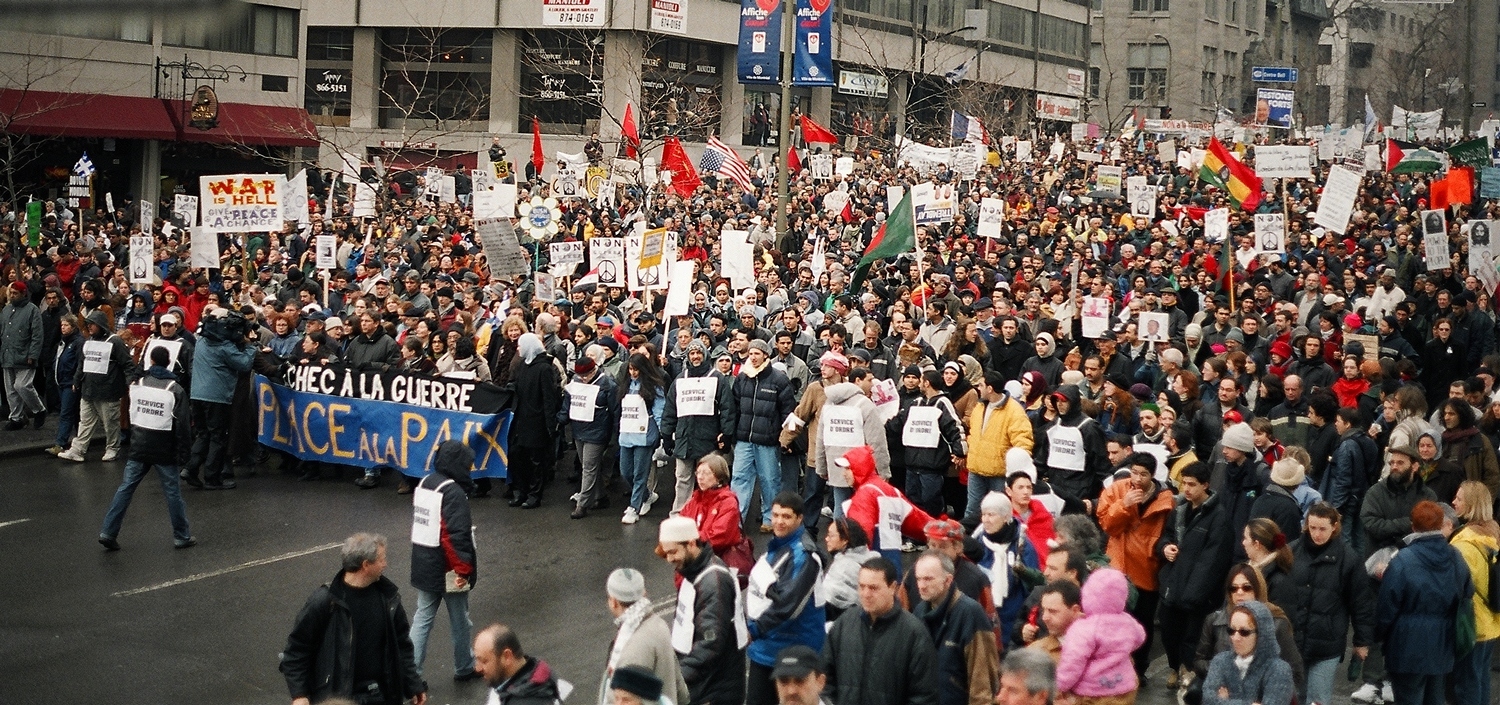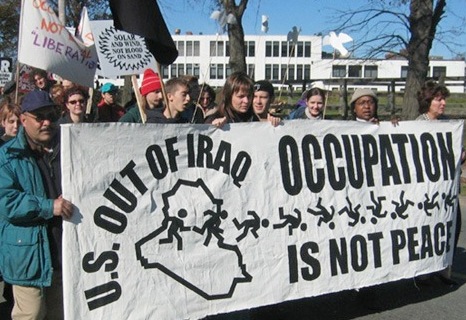March 19, 2003
U.S.-Led War on Iraq
 The 2003 U.S. invasion of Iraq
was carried out following an organized campaign of deception by
the U.S. which sent its Secretary of State, Colin Powell, to
theUN Security Council to introduce bogus evidence as "proof"
the government of Iraq possessed weapons of mass destruction.
This spectacle was meant to embroil the world in a fraudulent
debate about the threat Iraq supposedly posed to the security of
the world at a time the U.S. was preparing its "shock and awe"
campaign of terror to seize the country by force. In its bid to
destroy Iraq and take over the Middle East the U.S. never
received the approval of the UN Security Council.
The 2003 U.S. invasion of Iraq
was carried out following an organized campaign of deception by
the U.S. which sent its Secretary of State, Colin Powell, to
theUN Security Council to introduce bogus evidence as "proof"
the government of Iraq possessed weapons of mass destruction.
This spectacle was meant to embroil the world in a fraudulent
debate about the threat Iraq supposedly posed to the security of
the world at a time the U.S. was preparing its "shock and awe"
campaign of terror to seize the country by force. In its bid to
destroy Iraq and take over the Middle East the U.S. never
received the approval of the UN Security Council.
On March 20, 2003, the U.S., with a "coalition of the willing" comprised of the UK, Australia and Poland, initiated its second war against Iraq with a merciless "shock-and-awe" bombing campaign. The U.S. said that they would be met by millions of Iraqis coming out into the streets and hailing those who "liberated" them from Iraqi President Saddam Hussein. This did not happen.
The resistance movement was already at a high level against the brutal UN-approved sanctions regime which had killed thousands of Iraqis, including some 500,000 children, and destroyed civilian infrastructure. Following the "shock and awe" bombing of Baghdad, the resistance to U.S. aggression intensified and the U.S. then invaded with ground forces. Unspeakable crimes were committed during the U.S.-led war and occupation including gratuitous killings and then torture and covert operations for which the Bush administration became infamous. All of it destroyed Iraq, known as one of the cradles of civilization, and led to a period of profound instability there and in the region -- with more wars against the peoples, occupations, assassinations and crimes against humanity resulting in civilian casualties of untold proportions -- which is still not resolved.
The profound instability in Iraq and the region continues to cause havoc but the U.S. imperialists and their NATO allies and media shed no tears. In fact, today what was carried out covertly at the time of the Second Iraq War has become overt praise for U.S. and NATO-inspired and financed assassins, mercenaries, colour revolutions, coups d'état, regime change and disinformation campaigns on a scale hitherto unknown. The lies and disinformation told today about events in Ukraine make the lies about weapons of mass destruction, as outrageous as they were, look lame.
As took place when they invaded Iraq 20 years ago, today the U.S. and its allies, including Canada which is amongst the most warmongering countries, continue to blame their crimes on others and crow that they are liberators who defend freedom, democracy and peace.
Referring to the impending all-out U.S. war against Iraq, on March 17, 2003, Prime Minister Jean Chrétien announced that "If military action proceeds without a new resolution of the Security Council, Canada will not participate." There was no UN resolution, only massive U.S. imperialist disinformation about weapons of mass destruction, the "evil Saddam Hussein" and the sacred U.S. dedication to the cause of peace, freedom and democracy.

Montreal anti-war demonstration, March 22, 2003.
Huge anti-war demonstrations took place in Canada (250,000 people participated in one action in Montreal) and around the world. While Canada did not send ground forces, it had ships, planes and 1,000 military personnel in the Persian Gulf area. It maintained a liaison team at U.S. battle headquarters in Qatar and its ships and planes continued to co-operate with U.S. forces in the area. Canada also committed to sending 3,000 Canadian soldiers to replace U.S. soldiers in Afghanistan during the summer so that they could be freed up and rerouted to the Middle East. These measures, taken under the cover of the "war on terrorism," ensured that what constitutes terrorism and its causes were not discussed.
The U.S. imperialist campaign against terrorism targeted all resistance movements to state terror and all countries which refused to submit to the U.S. dictate. In the U.S., Canada and elsewhere, people were imprisoned under unjust security processes which kept them under indefinite detention on the basis of unproven allegations, suspended all civil rights and deported some to U.S. and other torture locations.
Mercenaries were employed to carry out black ops -- criminal activity which today is done in broad daylight. Torture sites – used by the U.S. to escape being held to account -- became notorious, such as the U.S. naval base at Guantánamo Bay.
 Ottawa demonstration, March 22, 2003.
Ottawa demonstration, March 22, 2003.
Sanctions Imposed on Iraq Following Gulf War
The UN Security Council imposed sanctions on Iraq in 1990, after Iraq was goaded into a war with Kuwait. This war was followed by a U.S.-led military "coalition of the willing" waging war on Iraq, known as the First Gulf War, which was conducted under a UN resolution authorizing the use of force.
Prior to the imposition of sanctions, Iraq had a relatively high standard of living, including a range of social services to provide for the people's well-being.
As living conditions in Iraq deteriorated because of U.S. sanctions, the U.S. government and monopoly media spread the disinformation that this was due to the misappropriation of funds from the sale of Iraqi oil for humanitarian purposes by the government of Saddam Hussein. This was used to justify further U.S. intervention, as it was claimed by the U.S. and others that the Iraqi people were suffering under Saddam Hussein and needed to be liberated.
The sanctions caused the deaths of 500,000 Iraqi children besides many other and the destruction of the systems of health care and education, and other infrastructure. In 1996, then U.S. Secretary of State Madeleine Albright, when asked about the losses of the children, replied that "we think the price is worth it." It is clear that the use of sanctions as a weapon of war by the U.S. imperialists and its allies aimed to bring a country to its knees in submission to U.S. dictate and later provided justification for war, alongside the lies about weapons of mass destruction.
Sanctions against Iraq were finally largely lifted in May 2003 after the destruction from the war reached proportions beyond what even the U.S. disinformation could blame on others. The notable exceptions were sanctions which gave the U.S. and UK control over Iraq's oil revenue which were not removed until December 2010. Sanctions requiring five per cent of Iraq's oil and natural gas revenue to be paid to Kuwait as reparations were lifted in 2013. Iraq's payment of reparations to Kuwait, via a 1991 UN Security Council Resolution, concluded in December 2021 with the final payment of a total of U.S.$52.4 billion having been made.
In an April 2021 interview, Denis Halliday, a former UN Assistant Secretary General and the UN Humanitarian Coordinator in Iraq spoke about the nature of the sanctions and the conditions in Iraq in the years prior to the 2003 war. Halliday resigned from the UN in 1998 in protest of the Security Council's refusal to lift the sanctions.
Q: Twenty years after you resigned from the United Nations, the United States is now imposing similar "maximum pressure" sanctions against Iran, Venezuela, Cuba, and north Korea, denying their people access to food and medicines during the pandemic. What would you like to say to Americans about the real-world impact of these policies?
Denis Halliday: The sanctions imposed by the Security Council against Iraq, led very much by the United States and Britain, were unique in the sense that they were comprehensive. They were open-ended, meaning that they required a Security Council decision to end them, which of course never actually happened – and they followed immediately upon the [1991] Gulf War.
The Gulf War, led primarily by the United States but supported by Britain and some others, undertook the bombing of Iraq and targeted civilian infrastructure, which is a violation of the Geneva Conventions, and they took out all electric power networks in the country.
This completely undermined the water treatment and distribution system of Iraq, which depended on electricity to drive it, and drove people to use contaminated water from the Tigris and the Euphrates. That was the beginning of the death-knell for young children, because mothers were not breast-feeding, they were feeding their children with child formula, but mixing it with foul water from the Tigris and the Euphrates rivers.
In addition, these conflicts introduced a new weapon called depleted uranium, which was used by the U.S. forces driving the Iraqi Army out of Kuwait. That was used again in southern Iraq in the Basra area, and led to a massive accumulation of nuclear debris which led to leukemia in children, which took three, four, or five years to become evident.
When I got to Iraq in 1998, the hospitals in Baghdad, and also of course in Basra and other cities, were full of children suffering from leukemia. Those children, we reckon perhaps 200,000 children, died of leukemia. At the same time, Washington and London withheld some of the medicines and treatment components that leukemia requires, again, it seemed, in a genocidal manner, denying Iraqi children the right to remain alive.
So I think the United States and its population, who voted these governments in, need to understand that the children and the people of Iraq are just like the children of the United States and England and their people.
We kill people with sanctions. Sanctions are not a substitute
for war -- they are a form of warfare.
(TML Archives; "We Kill People with Sanctions: An Interview with Denis Halliday," Nicolas J.S. Davies, Progressive Magazine, April 29, 2021.)

Montreal, March 22, 2003
 Toronto, March 30, 2003.
Toronto, March 30, 2003.

Windsor, April 12, 2003

Halifax, October 25, 2003.
This article was published in

Volume 53
Number 2 - March 2023
Article Link:
https://cpcml.ca/Tmlm2023/Articles/MS53026.HTM
Website: www.cpcml.ca Email: editor@cpcml.ca

